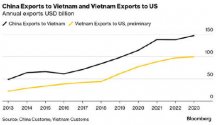The US is buying more from Mexico. At the same time Mexico is buying more from China. See how this works?
Mexico is part of NAFTA and they have lower salaries than in China. So the final assembly is moving there. But at the point things started to change and assembly switched to Mexico. China did not only dominate assembly. China also dominates the parts supply and intermediate products.
China's economy is also scaling up into other kinds of higher end products. So there will be no lack of drivers for economic prosperity.
Mexico is part of NAFTA and they have lower salaries than in China. So the final assembly is moving there. But at the point things started to change and assembly switched to Mexico. China did not only dominate assembly. China also dominates the parts supply and intermediate products.
China's economy is also scaling up into other kinds of higher end products. So there will be no lack of drivers for economic prosperity.

